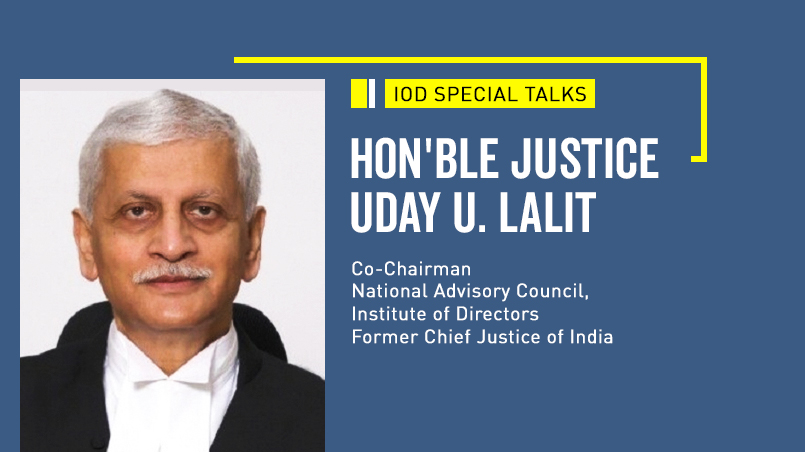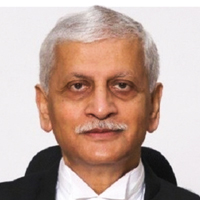 Connect with us
Connect with us

 Aug 08, 2024
Aug 08, 2024
Integrating Heritage and Innovation for Building a Sustainable Future
Today's august gathering virtually represents the 'who's who' in the fields of environment, science, and innovation. I consider it to be my personal privilege and pleasure to be associated with a symposium that is being held today. I always considered the Institute of Directors to be an organisation that is normally concerned with corporate governance, until I became one of the jury members to consider the applications for awarding what is called the Golden Peacock Awards. That actually opened my eyes to the fact that yes, we are trying to inculcate the habit of excelling even on the front of environment, innovation, and good practices when it comes to manufacturing processes, so that what is spoken of by all my previous speakers is achieving what is called the “net zero target." So therefore, corporate governance should be put in such a place that we are able to achieve that particular goal. I feel really proud that I am now associated with this exercise.
Ladies and gentlemen, as a child, I always used to think, and this is what I was taught, that the wettest place in this country is Cherrapunji, and the hottest place in this country is either Sikar or Churu in Rajasthan. I need to correct myself now; Cherrapunji lost that distinction long ago. Sikar and Churu normally used to record temperatures of just about 50°C or 51°C during the summer, but this year, Delhi surpassed that. So we need to now correct ourselves. We need to correct our geographical understanding, and that is the impact of what is called climate change.
As a child, I used to go to my grandmother's place in Pune every summer vacation. Her house did not have a ceiling fan. The house was designed in such a way that the environment was such that you never required any instruments, such as a ceiling fan or air conditioning. Today, go to every household in Pune, which must have at least three or four air conditioners, depending upon the number of bedrooms that you have. That is the impact of climate change.
As a child in school, I was never taught what pollution or climate change were. These words were completely foreign to school-going children. But no longer so-my grandchildren are now well versed when it comes to this kind of vocabulary, so much for intergenerational equity. This is what we are now leaving for the next generation to tackle and sort of deal with. That is why conferences such as this will open our eyes and try to see that the ideas get churned. We will come up with certain solutions and some innovations so that it will certainly be able to cope with all the challenges in the future.
Our heritage actually shows that we keep giving salutations to the environment in our morning prayers, whether it is “Gangge Ca Yamune Chaive Godaavari Sarasvati | Narmade Sindhu Kaaveri Jale-Asmin Sannidhim Kuru” (O Holy Rivers Ganga and Yamuna, and also Godavari and Saraswati, O Holy Rivers Narmada, Sindhu, and Kaveri; please be present in this water). We keep giving salutations. What does our national anthem say? Vindhya Himachal Yamuna. Therefore, these are actually not just mountains and rivers. These are very dear to us. Or Sujalam Suphalam Malayaja Sheetalam. This is what we have. We lost our track.
Perhaps I think that when it comes to climate change, we definitely are not on the right side. I don't want to sound pessimistic. I like the approach of Sarmad when he said that the very same glass, whether it is half empty or half full, is always full, so therefore, yes, we are definitely doing well. We are doing well on so many fronts when it comes to the environment.
When it comes to the environment, I, as a lawyer, am associated with some of the environmental causes, including forests and vehicular pollution. So therefore, I know the kind of responses that the judicial organ of the state always bestows on such issues.
The balance between the three P's-people, planet, and profit has to be maintained. If this equilibrium is maintained, then this is what is called achieving Sustainable Development Goals.
I'll give you one example: in the 1970s, the tiger population of this country had actually gone down. So 'Project Tiger' was implemented then. Today, what you see is that the number of tigers in the country has more than tripled. The tiger is always considered at the topmost level of the pyramid structure of the animal kingdom. If the number of tigers is increasing, the pyramid must be getting stronger.
When it came to biodiversity, there is a very famous judgment by the Supreme Court where a thriving business, Kudremukh Iron Ore Company, was directed to shut down because, where it was doing mining operations, perhaps there were biodiversity gene pools that could have been lost forever. That's the approach that we have always been coming out with, and that's the approach that we must now give to this particular ghost that is knocking at our door, called 'Climate Change'.
The Red Indian Chief of Seattle, way back in 1895, wrote a letter to the President of the United States, and he mentions the equilibrium between the earth and man, and that's the equilibrium that we must actually restore and must always respect, and the easiest way to put it is what you call the SDGs.
Institutions like IOD see to it that perhaps a lot of encouragement can be given to the corporate sector to mend its ways and to be on the right side of everything.
There are challenges; for instance, when we got our independence, we were just about 55 crores, and today we have surpassed that figure like anything. We are 140 crores on the same square footage of land. How do we serve this kind of population? Naturally, there will be demands on the environment, and the balance has to be maintained—the balance between the three P's—people, planet, and profit. If this equilibrium is maintained, then this is what is called achieving Sustainable Development Goals.
I'm not an expert-neither a scientist nor somebody who has dealt with climate change as an issue. I'm here, speaking from the perspective of a common man. I look at this gathering, which is the august body, which is, 'who's who', when it comes to the sphere of the environment. The entire society, the nation, and the community look forward to the churning of ideas here in this symposium to come up with definite solutions. Of course, institutions like IOD see to it that perhaps a lot of encouragement can be given to the corporate sector to mend its ways and to be on the right side of everything.
Thank you so much.

Excerpts from the 'Guest of Honour Address' delivered by Hon'ble Justice Uday U. Lalit, Co-Chairman, National Advisory Council, Institute of Directors; and former Chief Justice of India at th the 'Inaugural Session' of the 25 International Conference on Environment Management and Climate Change, held on June 27, 2024 in Hotel The Lalit Ashok, Bengaluru.
Owned by: Institute of Directors, India
Disclaimer: The opinions expressed in the articles/ stories are the personal opinions of the author. IOD/ Editor is not responsible for the accuracy, completeness, suitability, or validity of any information in those articles. The information, facts or opinions expressed in the articles/ speeches do not reflect the views of IOD/ Editor and IOD/ Editor does not assume any responsibility or liability for the same.
About Publisher

Bringing a Silent Revolution through the Boardroom
Institute of Directors (IOD) is an apex national association of Corporate Directors under the India's 'Societies Registration Act XXI of 1860'. Currently it is associated with over 30,000 senior executives from Govt, PSU and Private organizations of India and abroad.
View All BlogsMasterclass for Directors
Categories